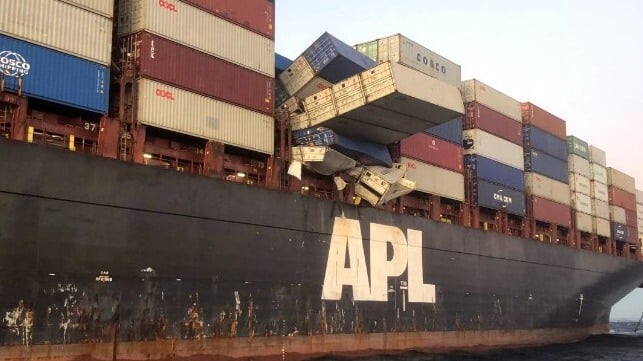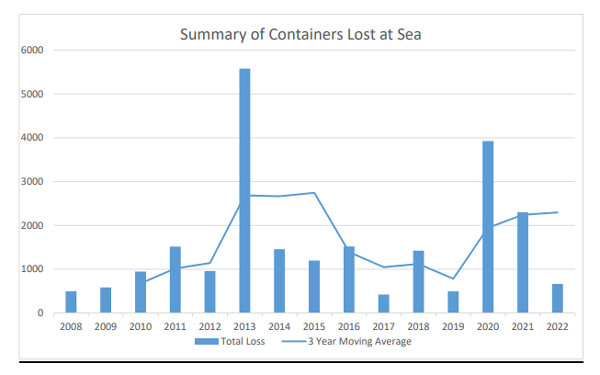Overboard Boxes at Record Low as Industry Avoids Large Casualties

The number of containers lost overboard from ships reached a new low in 2022 based on the percentage of containers handled each year according to newly released data from the World Shipping Council. Calling it a positive development for the industry, the trade group highlights the strong reversal of the trend from the last two years when significant casualties from a few vessels drove the numbers dramatically higher, without identifying specific issues resulting in the reduction in overboard incidents.
The report shows that just 661 containers were lost at sea in 2022, which represents a minuscule percentage of the estimated 250 million boxes transported each year. The report highlights that the number is near the three-year average 15 years ago when the WSC’s first report from 2008 to 2010 showed 675 boxes on average lost each year. The most recent three-year average however is 1,566 containers lost at sea per year.
Total losses jumped dramatically in 2020 and again in 2021 due to a series of high-profile incidents. The ONE Apus in November 2020 was the largest industry loss without a vessel casualty. Maersk also experienced high-profile incidents with the Maersk Essen followed shortly thereafter by the Maersk Eindhoven. All the vessels reported bad weather in the northern Pacific with the Maersk Eindhoven however experiencing a brief power loss due to an automatic engine shutdown leading to the boxes going overboard. Both years also saw multiple smaller incidents with weather frequently being cited as a contributing factor.
The WSC calculates the average over three-year periods. The spikes mostly correspond to similar large casualties such as the sinking of the MOL Comfort a decade ago, the Rena in 2011, and the El Faro in 2015. During 2022, the WSC reports most of its members saw no or single digit container losses, with only two carriers reporting losses above 100 boxes for the year.

(Source: WSC Containers Lost at Sea – 2023 Update)
"The reduction in containers lost at sea in 2022 is positive news, but there is no time for complacency,” said John Butler, President & CEO of the WSC in the press release detailing the results. “Every container lost at sea will always be one too many and we will continue with our efforts to make the sea a safer place.”
The trade group cites research efforts from a multi-year project launched in 2021 and the data contribution on the causes of containers overboard and how to prevent further incidents. They said more results are to come as the project enters its third and final year focusing on best practices, updated safety standards, and recommendations.
This year’s research they said is focusing on container and lashing gear strength, stowage planning and optimization, guidelines for vessel operation, and voyage planning. The report focuses on the shared responsibility between shippers, carriers, and ports. Proper packing, stowage and securing of containers, and reporting of correct weight are key to the safety of a containership, the WSC writes.
“How the cargo is packed and stowed in the container by the exporter, consignor or shipper is key to safe transport – both on sea and on land,” the report asserts. “The most important thing the party tendering the cargo can do to prevent losses is to make sure that cargo is conscientiously and correctly packed, declared and placarded, and its weight verified in line with applicable regulations.”
The issue of stack collapses and boxes overboard becomes increasingly important as the vessels continue to get larger and box stacks have risen in height. MSC, OOCL, and other carriers are beginning to launch a new class of vessels that exceeds 24,000 TEU. MSC’s vessels for example are designed for stacks up to 25 boxes high.

that matters most
Get the latest maritime news delivered to your inbox daily.
This year’s report does not address the issues of vessel handling and weather, but previously the WSC said initial research had identified that parametric rolling in following seas is especially hazardous for container vessels. They said the phenomenon was not well known and that the group was issuing training to crews on how to plan, recognize, and act to prevent parametric rolling in following seas.
The WSC highlights that it has also been working with regulators to advance efforts for container safety. The Maritime Safety Committee of the IMO approved guidelines for container inspection programs. The trade group is also supporting a proposal before the IMO’s committee that would require mandatory reporting of containers lost at sea. If adopted, they point out that the reporting requirements could become mandatory in 2026.
